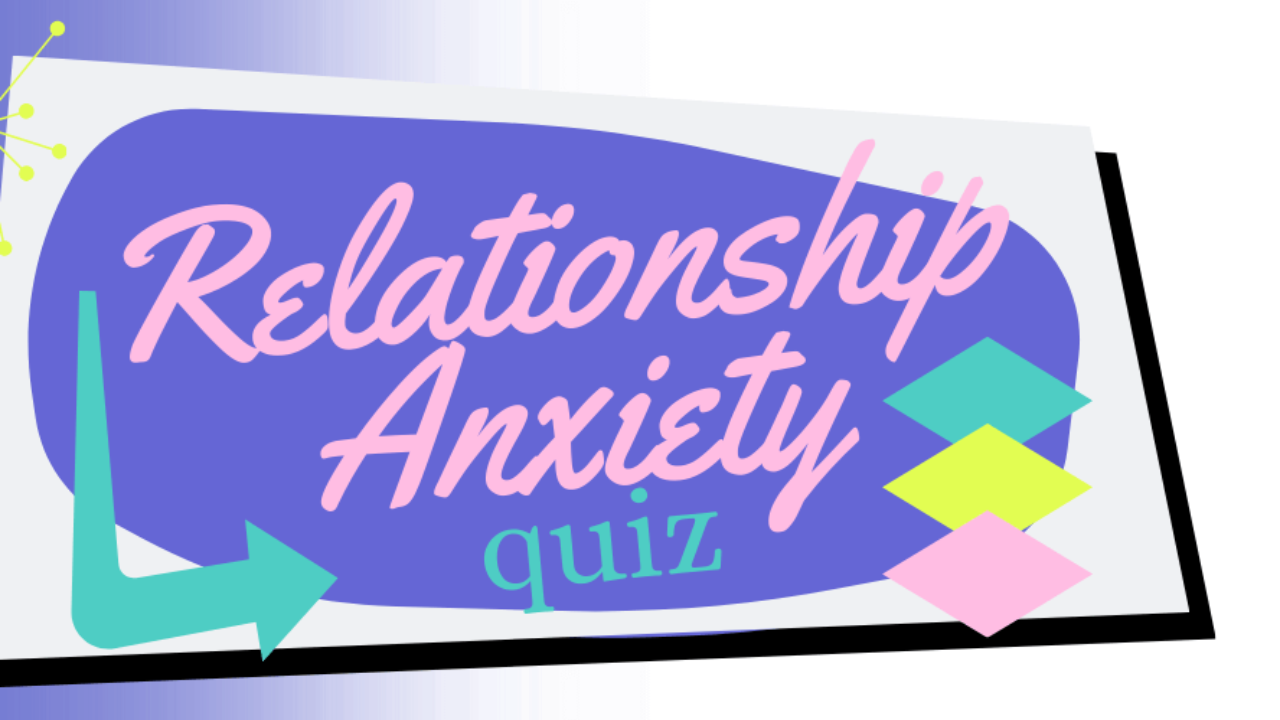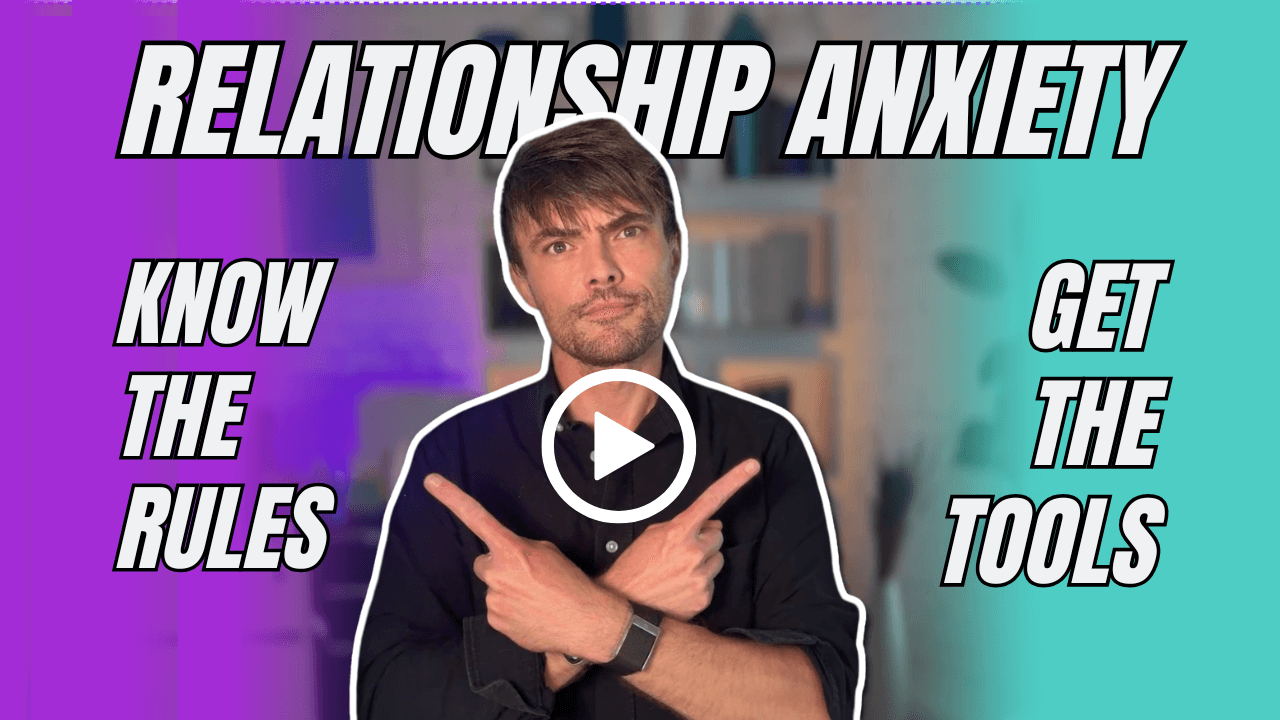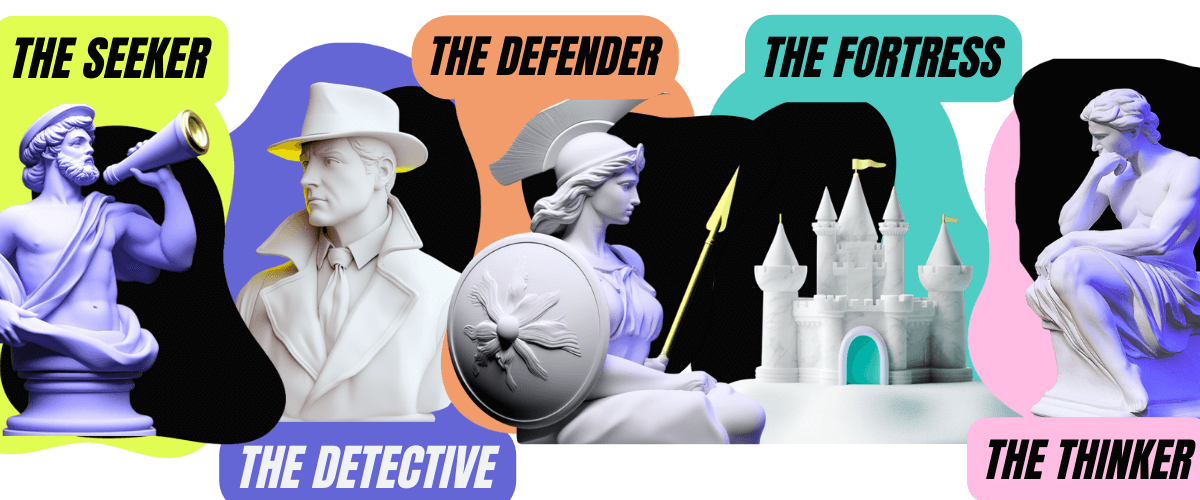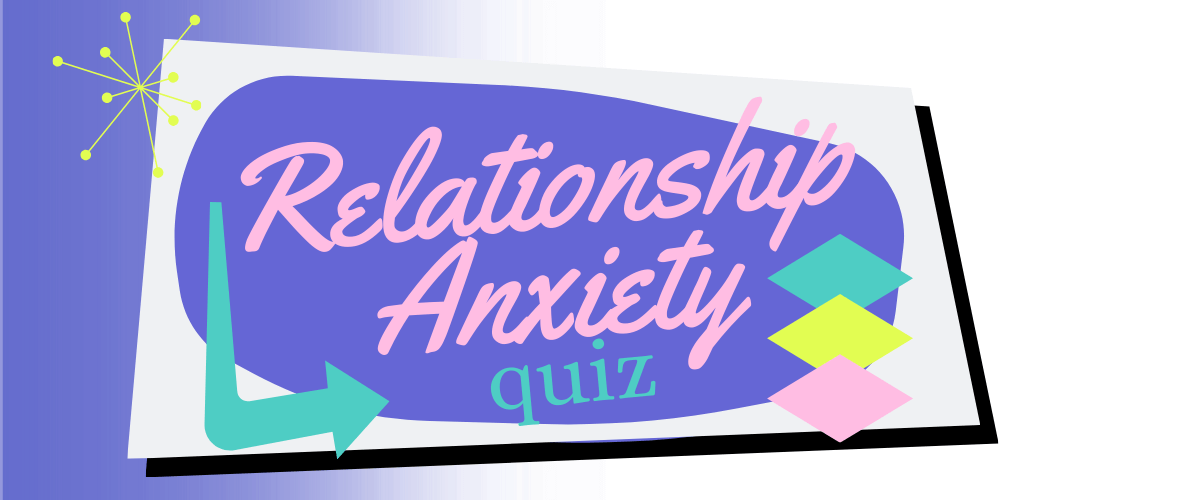How to Get Over Relationship Anxiety: Learn the Rules Anxiety Makes You Play By
Aug 31, 2025
How to Get Over Relationship Anxiety: Learn the Rules Anxiety Makes You Play By
Quick Take
Most advice suggests: communicate more, practice mindfulness, and try therapy. That helps—but it's not the whole picture. If you want to get over relationship anxiety, you have to name the rules anxiety is forcing you to play by (your hidden operating system), then use targeted interrupts to break those rules in real time.
This guide covers the essentials that searchers expect (definition, signs, causes, and proven strategies). It adds the missing piece: the Ten Rules of Anxiety, plus five Relationship Anxiety Archetypes, so your plan is precise, not generic.
To get the free tools to really get over relationship anxiety, take free the quiz and I'll email you one of the tools that's personalized for your anxiety archetyp.
Relationship Anxiety:
Relationship anxiety affects millions of people, turning what should enhance relationship quality into a minefield of worry and doubt.
But here's what most advice about overcoming relationship anxiety gets wrong: telling you to "just relax" or "trust more" ignores the deeper patterns at play. The truth is, your relationship anxiety isn't random chaos—it's following a predictable playbook of rules that your anxious mind has convinced you are essential for survival.
Once you understand these hidden rules that anxiety forces you to follow, you can finally start breaking them. And that's when real relationship adjustment becomes possible.
What Is Relationship Anxiety?
Relationship anxiety is a persistent pattern of worry, doubt, and over-monitoring that pulls you out of connection and into control. You might find yourself checking your partner's feelings, replaying texts, testing compatibility, or armouring up to avoid getting hurt. Occasional worry is common; persistent anxiety that shapes choices, mood, or health is a sign to act.
Relationship anxiety shares features with anxiety disorders like generalized anxiety disorder or obsessive-compulsive disorder, it's not actually a clinical diagnosis.
It's a pattern of anxious thoughts and behaviors that specifically target your romantic life. While occasional worry about marital quality or relationship adjustment is completely normal—especially during transitions or conflicts—persistent anxiety that creates marital distress needs attention.
This type of anxiety often stems from deeper attachment issues, past relationship experiences, or attachment styles formed in childhood. Your brain, in its misguided attempt to protect you from potential heartbreak, creates a constant state of hypervigilance that paradoxically damages the very quality of the relationship you're desperate to preserve.
The Signs of Relationship Anxiety: Five Archetypes That Reveal Your Pattern
Not all relationship anxiety looks the same. Through years of observing patterns that affect relationship satisfaction, we've identified five distinct archetypes, each with its own set of symptoms and behaviors. Understanding which archetype you embody—and recognizing the signs of relationship anxiety in yourself—is the first step toward improving your relationship quality.
The Threat Detective
Suppose you're constantly scanning for signs of danger in your relationship and experiencing persistent negative thoughts about your partner's intentions. In that case, you might be the Threat Detective. This archetype sees potential threats everywhere—a delayed text becomes proof of waning interest, checking their social media becomes compulsive, and a quiet mood signals impending breakup. The Detective's gut feelings work overtime, but they're often misleading, interpreting every ambiguous signal as evidence of betrayal or abandonment.
You may experience physical symptoms, such as a racing heart or sweaty palms, when you are unable to reach your partner immediately. Constant surveillance can be it's own form of marital distress. Your partner will start feeling perpetually under investigation or feel like they're walking on eggshells to avoid triggering your suspicions.
The Seeker
The Seeker craves one thing above all else: certainty. This archetype, often rooted in anxious attachment style, needs constant reassurance that the relationship is secure. You may require regular check-ins throughout the day, need to hear "I love you" multiple times, or experience gut feelings of panic when you can't immediately reach your partner.
The cruel irony is that no amount of reassurance ever feels like enough. The relief from each validation lasts mere minutes before anxiety creeps back in, demanding another hit of certainty. This pattern often requires the intervention of licensed therapists who understand how reassurance-seeking actually maintains anxiety. Partners of Seekers usually start willing to provide reassurance but eventually become exhausted, leading to decreased relationship satisfaction on both sides.
The Thinker
The Thinker is the ultimate 'worrier', and is often worrying about their partner or their relationship - or even their own feelings.
"Do I really love them?" "Are we right for each other?" "What if I'm settling?" These questions loop endlessly, resembling the intrusive thoughts seen in relationship OCD (a subset of obsessive-compulsive disorder).
This archetype can spend hours dissecting conversations or scrolling social media to compare their relationship to others. The overthinking becomes so consuming that it causes physical symptoms—headaches, nausea, and insomnia. Your mental health suffers as you spiral into doubt. At the same time, your partner watches helplessly, unsure how to help improve the relationship adjustment you both need.
The Defender
The Defender battles an internal critic that creates persistent marital distress through self-doubt. This archetype's would may stem from deep attachment issues and is characterized by feelings of unworthiness—"I'm not good enough for them," "They'll realize they can do better," "I don't deserve this love." Even in moments of positive relationship quality, the inner voice whispers that it won't last.
Testing your partner's love through self-sabotage, creating unnecessary conflict that damages marital satisfaction are ways anxious behaviors cause damage.
Licensed therapists often note that this pattern requires addressing underlying mental health concerns and attachment style issues. The tragedy is that no amount of external validation can quiet the internal critic—healing must come from within, often through therapeutic approaches like cognitive-behavioral therapy.
The Fortress
Perhaps the most common but least recognized type, The Fortress maintains rigid emotional boundaries that prevent intimacy. This fear of intimacy manifests as a resistance to deep conversations and a reluctance to be vulnerable. Unlike the Seeker who clings, the Fortress withdraws, creating a relationship that feels more like coexistence than connection.
This archetype often develops from past hurts and trust issues—you've learned that opening up leads to pain, so you've built walls that damage relationship quality. Communication styles become guarded and defensive. Your partner feels lonely even when you're together, constantly asking to be let in. At the same time, you struggle with the terrifying prospect of emotional exposure. This pattern has a significant impact on long-term relationships and marital functioning.
The Hidden Rules: Why Traditional Advice Doesn't Work
Anxiety in relationships operates according to specific rules that affect relationship adjustment and satisfaction. These rules, developed by your anxious mind to protect you from perceived threats, actually create the marital distress you're trying to avoid.
Understanding the rules is a head start for anyone working with licensed therapists or trying to improve their mental health, because once you can see the game anxiety is playing, you can stop following its playbook:
The Ghost of Relationships Past forces you to view current situations through the lens of old wounds, damaging the quality of your present relationships by making your partner pay for past betrayals.
The Mind-Reading Mandate convinces you that you know exactly what your partner is thinking, turning neutral expressions into negative thoughts about the relationship.
The Doubt Dilemma creates uncertainty where none existed, making you question even the most positive relationship quality indicators.
The Unworthiness Clause whispers that you don't deserve love, creating persistent marital distress through self-sabotage.
The Law of Constant Contact demands continuous reassurance and connection, turning healthy relationships into codependent ones.
The Regulate Me Requirement hands over your emotional stability to your partner, damaging relationship functioning by making them responsible for your mental health.
The Sabotage of Serenity makes peaceful moments feel dangerous, causing you to create conflict when marital satisfaction is actually high.
The Vulnerability Ban prevents you from opening up and maintaining trust, which are issues that prevent genuine intimacy.
The Lockdown Law attempts to control every aspect of the relationship, from social media interactions to daily routines, to eliminate uncertainty.
The Conflict is Catastrophe Rule treats every disagreement as a threat to relationship quality, thereby preventing the development of healthy communication styles.
Common Causes and Contributing Factors
Understanding where relationship anxiety comes from can help normalize your experience and point toward healing. Several factors commonly contribute to these patterns that affect intimate relationships.
Your attachment style, formed in early childhood, plays a crucial role in relationship functioning. If your early relationships were inconsistent or unpredictable, you likely developed attachment issues that manifest as anxiety in adult relationships. These early patterns become the blueprint for how you experience intimacy and trust.
Past relationship trauma creates templates for future fears. Previous betrayals or abandonments fuel trust issues that persist even in healthy relationships. Your anxious mind uses these experiences as evidence that history will repeat, keeping you hypervigilant and unable to engage in positive relationship quality fully.
Mental health conditions like generalized anxiety disorder, obsessive-compulsive disorder, or specifically relationship OCD can manifest in romantic contexts. These anxiety disorders turn your relationship into the primary focus of anxious thoughts and compulsive behaviors, from constant social media checking to endless reassurance-seeking.
Low self-esteem directly feeds relationship anxiety, creating persistent doubts about your worthiness of love. When you don't believe you deserve a positive relationship, every interaction becomes filtered through this lens of inadequacy.
The Impact on You and Your Partner
Relationship anxiety doesn't just affect individual mental health—it creates dynamics that impact both partners and overall relationship satisfaction. For the anxious partner, life becomes an exhausting experience. You're constantly monitoring, analyzing, and attempting to control outcomes. Physical symptoms like upset stomach, tension headaches, and insomnia become regular companions. The mental load of maintaining hypervigilance drains energy from other aspects of life.
Your gut feelings, which should help guide you, become unreliable as anxiety distorts your perception. Simple activities, such as your partner checking social media or having different communication styles, can become sources of intense distress.
For your partner, the impact on relationship quality is equally significant. They may initially try to provide reassurance and support, but over time, it seems that nothing is enough. They might feel as if they're walking on eggshells, constantly being tested, or never being truly trusted despite their consistency. This creates its own form of marital distress, as they struggle between wanting to help and feeling suffocated by the constant need for validation.
The relationship itself suffers as genuine intimacy becomes replaced by anxiety management. Instead of growing together and improving relationship adjustment, you're stuck in repetitive cycles. Marital functioning deteriorates as couples therapy becomes necessary just to maintain basic communication.
Breaking Free: Evidence-Based Approaches
Overcoming relationship anxiety requires more than just willpower—it needs targeted strategies that address your specific patterns. Licensed therapists often recommend a combination of approaches to improve relationship quality and mental health.
Cognitive-behavioral therapy helps identify and challenge the negative thoughts that fuel anxiety. By recognizing thought distortions and developing healthier thinking patterns, you can reduce the intensity of anxious feelings and improve relationship satisfaction.
Mindfulness practices and deep breathing exercises help you stay present rather than spiraling into future worries or past traumas. These techniques, often taught in therapy, help regulate your nervous system and hopefully reduce the physical symptoms of anxiety.
Take the First Step: Discover Your Archetype
Real change in relationship quality begins with an accurate understanding of the situation. When you know which archetype you embody and which rules are controlling your relationship anxiety, you can finally stop fighting shadows and start addressing the real patterns keeping you stuck.
We've developed a comprehensive assessment that identifies your specific relationship anxiety archetype and reveals the hidden rules affecting your relationship satisfaction. This isn't just another personality quiz—it's a diagnostic tool that provides personalized insights into your unique anxiety patterns and their impact on relationship functioning.




